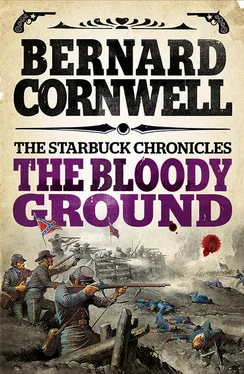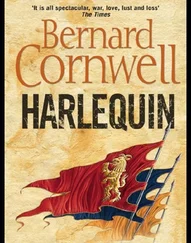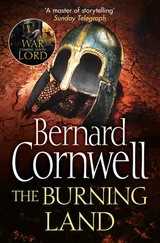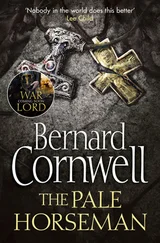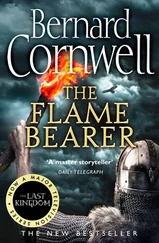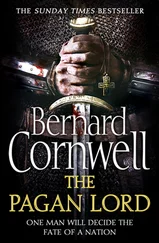“I’m afraid so, sir.”
“And his second in command is missing, maybe dead, maybe captured. What was his name?”
“Blythe, sir,” Adam said bitterly. He had never liked, much less trusted, Billy Blythe.
“So Galloway’s Horse, so far as I can see, is a dead beast,” Thorne said. “No employment for you there, Faulconer. Are you married?”
The sudden question surprised Adam. He shook his head. “No, sir.”
“Quite right, too. A mistake to marry early.” Thorne went silent for a moment. “I’m making you a major,” he said abruptly, then waved Adam’s embarrassed thanks to silence. “I’m not promoting you because you deserve it, I don’t know if you do, but because if you work for me you’ll be constantly harassed by brainless staff officers and the higher your rank the less obnoxious that harassment will be.”
“Yes, sir,” Adam said.
Thorne drew on his cigar and stared at Adam. He liked what he saw. Major Adam Faulconer was a young man, fair haired and bearded, with a square, trustworthy face. He was, Thorne knew, an instinctive Unionist and an honest man, but maybe, Thorne reflected, those were the wrong qualities for this job. Maybe he needed a rogue, but the choice had not belonged to Thorne. “So what are you to do, Faulconer? I shall tell you.” He stood again and began pacing up and down behind his desk. “We have hundreds of sympathizers behind the enemy lines and most of them are no damn good. They see a rebel regiment march past and they’re so overawed by the column’s length that they report ten thousand men where in truth they’ve only seen a thousand. They send their messages and Detective Pinkerton multiplies their figure by three and Little George quakes in his fighting boots and begs Halleck to send him another army corps, and that, Faulconer, is how we’ve been conducting this war.”
“Yes, sir,” Adam said.
Thorne tugged up a window sash to let some of the cigar smoke out of the room. The city’s sewage stench wafted in with a flutter of moths that flew suicidally toward the yellow-blue flames of the gas jets. Thorne turned back to Adam. “But I have a handful of agents of my own, and one of them is of particular value. He’s a lazy man and I doubt that his allegiance to the North is anything other than a cynical calculation as to the war’s outcome, but he has the possibility of revealing the rebel’s strategy to us, everything! How many? Where? Why? The same kind of thing you tried to reveal on the peninsula. But he’s also a timid man. His patriotism is not so strong that he fancies a hempen rope round his neck on a rebel gallows, and for that reason he is a cautious man. He will send us dispatches, but he will not use any means except those of his own devising. He won’t risk his neck trying to ride through the lines, but said I could provide a courier who could run that risk, but he insisted it would have to be someone he could trust.” Thorne paused to draw on his cigar, then jabbed it toward Adam. “He named you.”
Adam said nothing. Instead he was trying to think of someone who matched Thorne’s description, someone he obviously knew well in his native Virginia, but he could pluck no name or face out of his tangled memories. For a few wild seconds he wondered if it was his father, then he dismissed that thought. His father would never betray Virginia as Adam had done. “Might I ask—” Adam began.
“No,” Thorne interrupted. “I’m not giving you his name. You don’t need his name. If a message reaches you then you’ll probably realize who he is, but it won’t help you to know now. To be frank, Faulconer, I don’t know what will help you. All I know is that one weak man in the Confederacy has told me he’ll address his dispatches to you, but beyond that all is mystery.” Thorne spread his arms in a gesture that expressed his own dissatisfaction with the clumsy and imprecise arrangements he was describing. “How my man will reach you, I don’t know. How you will reach him, I cannot guess. He won’t take risks, so you’ll have to. All I can tell you is this. Just over a week ago I sent this man a message demanding that he find an excuse, any excuse, to attach himself to Lee’s headquarters and I have no reason to think he will disobey. He won’t like it, but he will do as I ask. He will stay close to Lee’s headquarters and you will stay close to McClellan’s. Little George will think you’re a nuisance, but you’ll have papers saying that you work for the Inspector General and are preparing a report on the efficacy of the army’s signaling systems. If Little George does try to hobble you, tell me and I’ll rescue you.” For a moment Thorne faltered, suddenly beset by the hopelessness of what he tried to do. He had told Adam the truth, but he had not revealed how ramshackle the whole arrangement was. His man in Richmond had provided Adam’s name weeks before, not in connection with this scheme, but as a messenger who could be trusted and now, in utter desperation, Thorne was recruiting Adam in the hope that somehow his reluctant Southern agent could discover Lee’s strategy and communicate it to Adam. The chances of success were slender, but something had to be done to neutralize Pinkerton’s defeatist intelligence and to ward off the dreadful prospect of a Southern victory that would invite the damned Europeans to come and dance on America’s carcass.
“You’ve got a good horse?” Thorne asked Adam.
“Very good, sir.”
“You’ll need money. Here.” He took a bag of coins from his desk drawer. “United States gold, Faulconer, enough to bribe rebels and maybe get you out of trouble. My guess, and it is only a guess, is that my man will send you a message saying where he will leave his dispatches. That place will be behind enemy lines, Faulconer, so you’ll need a good horse and the ability to bribe any rebel scum who give you trouble. Tomorrow morning you go to the camp on Analostin Island to meet a Captain Bidwell. He’ll tell you all you need to know about the signals system so that you can talk intelligently to Little George about telegraphs and wig-waggers. After that you follow Little George and wait for a message. Take the gold with you. That’s all.”
Adam, so summarily dismissed, hesitated. He had a score of questions, but Thorne’s brusqueness discouraged him from asking any of them. The colonel had uncapped an inkwell and had begun writing, so Adam just went to the desk and lifted the heavy bag, and it was not until he had reached the hallway downstairs and was buckling on his sword belt that it occurred to him that Thorne had never once asked him whether he was willing to risk his life by riding behind the rebel lines.
But maybe Thorne had already known the answer. Adam was a patriot, and for his country that he loved so passionately, any risk was worth taking and so, at a spy’s bidding, he would ride into treachery and pray for victory.
Starbuck carried the brandy back to the office, locked the door, and lay down with the fully loaded Adams beside him. He heard Holborrow return, and later he heard the four captains go to their beds upstairs, and sometime after that he slept, but he was wary of Captain Dennison’s revenge and so his sleep was fitful, though he was dreaming by the time Camp Lee’s bugles called a raucous reveille to startle him awake. The sight of the undrunk brandy bottle reminded him of the previous night’s confrontation and he took care to strap his revolver about his waist before he went through the house to the backyard, where he pumped himself a bucket of water. A mutinous Lucifer glared at him from the kitchen door. “We’ll be leaving here in an hour or so,” Starbuck told him. “We’re going back to the city.”
“Heaven be praised.”
“Bring me some coffee with the shaving water, would you? And bread?”
Читать дальше
